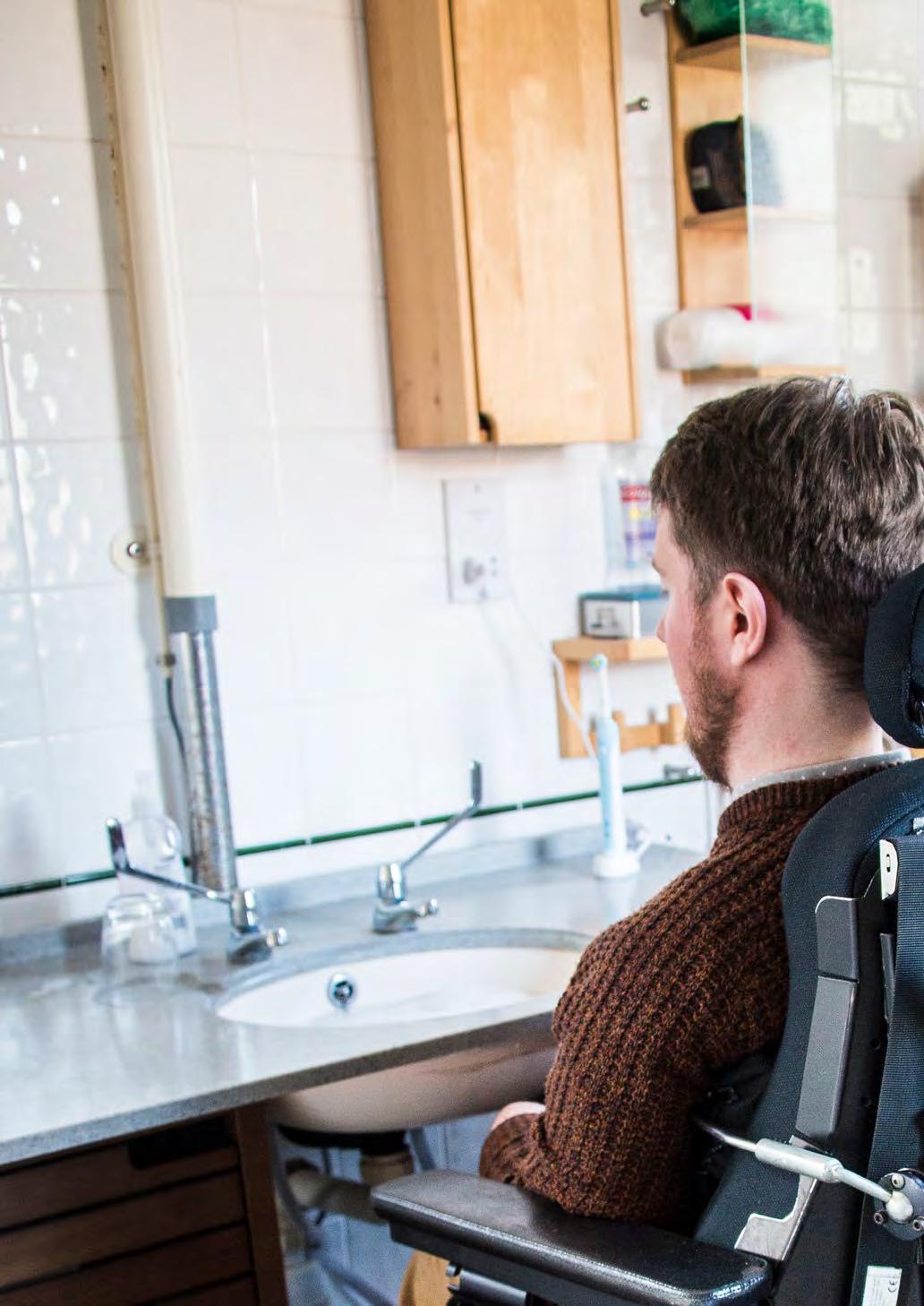
11 minute read
Glossary
Accessible housing: housing that has physical features that enable the occupier to move around it safely and easily and have full use of its facilities. This can include ramped entrances, level-access showers, stair lifts, spacious bedrooms, widened corridors and doorways, low-level sinks, sockets and switches. Accessible housing is particularly advantageous to disabled people with physical impairments.
Adaptable housing: housing that can be adapted to increase accessibility, and to install features that allow for independent living.
Advertisement
Adaptations: changes to the home environment that are intended to ensure that disabled people can live independently. These can be broken down into two categories:
• Minor adaptations: examples include grab/hand rails, steps or r amps to allow access to a property, sink and tap adjustments. These can usually be actioned quickly and for relatively little cost.
• Major adaptations: this covers major physical and structural changes to a property, including wet-room conversions, stair-lifts, mechanical hoists and structural changes to a building (such as room extensions) or to a building’s structural layout (partition walls, additional rooms).
Advocacy: supporting and representing individuals so that they can communicate their wishes, as well as secure their rights and gain access to services.
Affordable housing: this includes social rented, affordable rented and intermediate housing, provided to households whose needs are not met by the market.
Affordable rent: a kind of rent that is subject to rent controls that require a rent of no more than 80 per cent of the local market rent (including service charges, where applicable).
Affordable rented housing: properties let by local authorities, or private registered providers of social housing (housing associations), to those who are eligible and qualify to be on the local authority’s housing register. Affordable rent is subject to rent controls that require a rent of no more than 80 per cent of the local market rent (including service charges, where applicable).
Allocation policy: a local authority, Registered Social Landlord or housing cooperative’s allocation policy is the set of rules that they use to decide who is eligible for a housing tenancy. Each local authority and Registered Social Landlord has its own rules for allocating housing. Some of the rules are based on the law, while others are up to the individual council or Registered Social Landlord to decide.
Anti-social behaviour: aggressive, intimidating or destructive activity that has a negative impact on other people.
Approved Document M: this refers to Part 1 (Dwelling) of the Building Regulations in England: it ensures that disabled people are able to access and use buildings and facilities. Buildings fall into three distinct categories:
• M4(1) Category 1 – visitable dwellings. Compliance with this re quirement is met when a new dwelling makes reasonable provision for most people, including wheelchair users, to access and enter the dwelling, and access habitable rooms and sanitary facilities on the entrance level.
• M4(2) Category 2 – accessible and adaptable dwellings. This requirement is met when a new dwelling makes reasonable provision for most people to access the dwelling and includes features that make it suitable for a range of potential occupants, including older people, individuals with reduced mobility and some wheelchair users.
• M4(3) Category 3 – wheelchair-user dwellings. This requirement is met when a new dwelling makes reasonable provisions for a wheelchair user to live in the dwelling and have the ability to use any outdoor space, parking and communal facilities.
Assured shorthold tenancy: usually found in the private rented sector, this type of tenancy usually lasts from six to twelve months. A deposit is normally paid up-front, and the tenant commits to paying the rent for the lifetime of the contract. Though common, this type of tenancy is less secure than other types of tenancy, such as those that are longer term.
Assured tenancy: an agreement that is usually offered by social housing providers to their tenants. Tenants can live in the property for as long as they wish, as long as they abide by the tenancy agreement. This type of tenancy is generally more secure than an assured shorthold tenancy.
Buy-to-let: residential property that is bought with the intention of letting it to someone else.
Choice-based letting (CBL): one of the methods used by social housing providers to allocate housing. In a choice-based letting system, the housing provider advertises available properties and people bid for the properties that they wish to live in.
Common Housing Register (CHR) or Housing Register: a local authority’s list of people applying for social housing, including housing that is owned and/or managed by the council and housing associations.
Disabled person: according to the Equality Act 2010, a person is disabled if they have an impairment that has a substantial and long-term adverse effect on their ability to carry out normal day-to-day activities.
Grants for adaptations: government funding made available for home adaptations. Schemes include the Disabled Facilities Grant for England and Wales, the Local Authority Scheme of Assistance for Adaptations, stage three adaptations for social housing tenants, and local housing authority funding in Scotland.
Homes England: the successor title to the Homes and Communities Agency (HCA). An executive, non-departmental public body sponsored by the Ministry for Housing, Communities and Local Government and the body responsible for the regulation of social housing.
Housing department: a department within a local authority that deals with housing issues such as the allocation of council housing, housing advice and applications for housing from homeless people.
Human rights approach: a proactive approach that is taken by a public body in exercising its powers and ensuring that its legal obligations are met, so that any risk of a breach of human rights is adequately addressed.
Independent living: having an equal right to live freely in the community and to participate fully in society. Fulfilling this right includes removing barriers that prevent access to housing, so that disabled people have the same rights as non-disabled people to choose where and with whom to live. Independent living does not mean that disabled people necessarily live on their own or without support.
Intermediate housing: homes for sale and rent that are provided at a cost above social rent, but below market levels (subject to the criteria in the definition of affordable housing, above). These can include homes with shared equity (shared ownership and equity loans) and other low-cost homes for sale and intermediate rent, but not affordable rented housing.
Landlord: a person, organisation or company that rents out property. A landlord can be a person who rents out a room in their house, or a local authority or housing association renting out thousands of homes. If a landlord rents out property purely for profit, they are called a private landlord. Local authorities, housing associations and housing cooperatives are known as social landlords.
Landlord register: a formal register of all landlords and letting agents within a local authority area. Every council in Scotland and Wales has a ‘landlord register’.
Lifetime Homes Standards: homes that are designed to incorporate certain features that are intended to add comfort and convenience, particularly for disabled and older people. Lifetime homes are easily adaptable at minimal cost.
Local authority: an elected body with official responsibility for governing a particular area, including delivering services and approving development.
Local Government Association: a cross-party, umbrella organisation that works on behalf of councils to ensure that local government has a strong, credible voice in communicating with national government.
Local Plan: a Local Plan sets out a vision and a framework for the future development of the area, addressing needs and opportunities in relation to housing, the economy, community facilities and infrastructure – as well as a basis for safeguarding the environment, adapting to climate change and securing good design. It will set out the local planning policies and identify how land is used/to be used, determining what will be built and where.
National Planning Policy Framework: the national planning policy for England which acts as the policy framework for local planning authorities and decision-makers, on both drawing up Local Plans and making decisions about planning applications.
Non-settled accommodation: this refers to accommodation arrangements that are precarious, such as where a person has no or little security of tenure/residence in their usual accommodation, and so may be required to leave at very short notice.
Occupational therapist: a professional who supports and enables people’s participation in daily activities despite impairments or limitations in their physical or cognitive functioning. Occupational therapists are often employed by local authorities or the NHS.
The Planning Inspectorate (PINS): the body that deals with planning appeals, nationally significant infrastructure project applications, examinations of Local Plans, and other planning-related and specialist casework in England and Wales, on behalf of the Minister for Housing, Communities and Local Government. Planning inspectors play an important role in examining Local Plans, impartially and publicly. They examine the local plans produced by local authorities in England and Wales, and decide whether or not they are fit for purpose.
Private Residential Tenancy (Scotland): a tenancy in Scotland that replaces assured and short assured tenancies. This introduces open-ended tenancies, limits on the number of rent increases, longer notice periods and simpler processes.
Public Sector Equality Duty: this is set out in section 149 the Equality Act 2010. It states that a public authority must, when performing its functions, have due regard to the need to eliminate discrimination, and advance equality of opportunity for disabled people. The duty includes having due regard in particular to the need to remove or minimise disadvantages suffered by disabled people, and to take steps to meet the needs of disabled people.
Registered Social Landlords: not-for-profit housing providers, sometimes known as housing associations. As providers of social housing, Registered Social Landlords are registered and regulated by the Scottish Housing Regulator in Scotland, and the Welsh Government in Wales, whilst Registered Providers of Social Housing are the English equivalent, registered and regulated by Homes England (which replaced the Homes and Communities Agency in January 2018).
Registered Tenant Organisation (RTO): an independent organisation that is set up primarily to represent tenants’ housing and related interests. Their aim is to give tenants a voice and a recognised role when it comes to making local decisions.
Settled accommodation: this refers to medium to long-term accommodation. The principal characteristic of settled accommodation is that the occupier has security of tenure/ residence.
Social landlord: a not-for-profit housing provider, such as a council or housing association, that will normally charge rent at affordable rates (which are usually covered, for those on a low income, by Housing Benefit).
Social rent: a target rent is set for each property, based on a formula that takes into account property value, number of bedrooms, and local average earnings. The Government has placed a cap on the upper limit that can be charged, even if the target rent is higher. The cap increases annually by the rate of inflation (RPI) plus one per cent. Rents are increased annually, and increases follow rules set out by the Homes and Communities Agency (the Government agency that regulates housing associations).
Starter tenancy: new tenants may be offered a starter tenancy on a trial basis, usually lasting 12 months.
Supported housing: a range of housing services for a range of people with different requirements including supported living, group homes, refuges, sheltered housing, extra care housing and hostels.
Social rented housing: housing that is owned by local authorities and private registered providers, for which guideline target rents are determined through the national rent regime. Social rented housing may also be owned by other people and provided under equivalent rental arrangements, as agreed with the local authority or with the Homes and Communities Agency.
Technical housing standard: this deals with internal space within new dwellings, and is suitable for application across all tenures. It sets out requirements for the Gross Internal (floor) Area of new dwellings at a defined level of occupancy, as well as floor areas and dimensions for key parts of the home, notably bedrooms, storage areas and ceilings.
Tenancy agreement: a contract between a tenant and their landlord. It sets out the rights and responsibilities that tenants and landlords have, some of which are statutory.
Tenancy support services: these enable people to manage and sustain a tenancy. They may include help dealing with:
• rent arrears
• benefits
• domestic budgeting (including debt counselling)
• repair issues
• neighbour disputes
• anti-social behaviour issues that are related to the tenancy
• advocacy and advice in accessing other services.
T enant management organisation: a group made up of local authority tenants in England who follow The Housing (Right to Manage) (England) Regulations 2012.
Tenure: there are different categories of tenure for housing, house building and households. These are:
• owner-occupied – accommodation that is owned outright, or is be ing bought with a mortgage
• rented privately
• rented from housing associations
• rented from local authorities.
The United Nations Convention on the Rights of Persons with Disabilities (UNCRPD): is an international legal agreement about the human rights of disabled people.
Welsh Local Government Association (WLGA): this represents the interests of local government and promotes local democracy in Wales. The WLGA’s primary purposes are to promote better local government and the reputation of local government, and to support authorities in the development of policies and priorities, which will improve public services and democracy.










